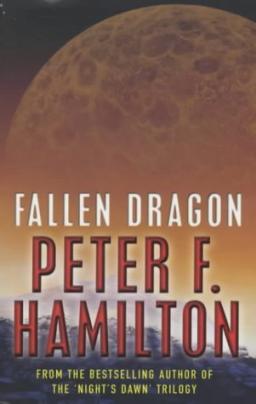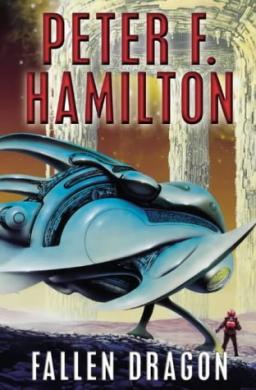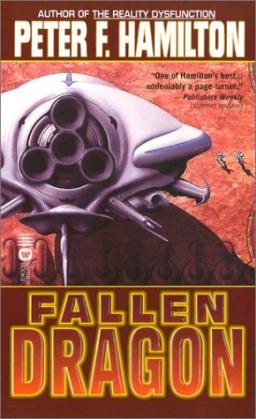ISFDB: http://www.isfdb.org/cgi-bin/pw.cgi?41b616

|

|

|
Peter F. Hamilton is considered one of the "important" authors of modern British SF, so I'm glad to have had a chance to read this book. Unfortunately it seemed to this reviewer like a half-digested mass of a higher-tech William Gibson combined with a few driblets of Alistair Reynolds.
Hamilton has clearly developed a great many set pieces and a deal of background for this novel, but he makes the amateur's mistake of trying to work in everything he's thought of. There are many scenes of description which are not only information-dump, but also not even information-dump that's relevant to the plot; one could skip over large chunks of this without missing anything. Like Reynolds in places, and especially like Mary Gentle's recent work, Hamilton seems more interested in describing the scene for the film-maker than in telling a story.
The story itself is quite weak, relying on coincidences and misunderstandings to avoid unravelling completely. It carries one along, to some extent, but it's certainly not suspenseful or unpredictable. Our protagonist changes characterisation as necessary to fit the plot. His story is told through flashbacks, and even this reviewer found himself skimming the page after page of descriptions of terraforming procedures. Another protagonist suddenly turns out, about half-way through the book, to be a family of clones all with the same name, rather than the single person we've been encouraged until now to think he is.
The writing itself is often turgid, and Hamilton (or perhaps his copy-editor) seems to be unclear on the meaning of words such as "apex"; several times, infelicitous phrases (such as "alignment power coupling") cause one to stumble and be thrown out of what thin suspension of disbelief one had managed. The Gibsonion emphasis on brand names and the "coolness" of lethal technology would have been appropriate had this book been published fifteen or twenty years ago, but now look dated.
Hamilton is good on ideas, but ideas are the easiest part of writing; and many of the ideas are clearly borrowed from better authors, for all he puts his own spin on them. This is not an entirely worthless book; if Hamilton can develop better plotting, characterisation and technical writing skills, he'll be a writer to watch.